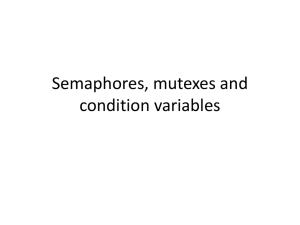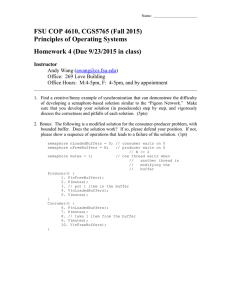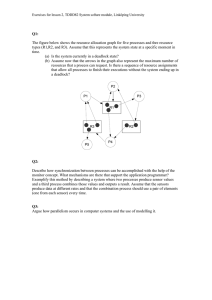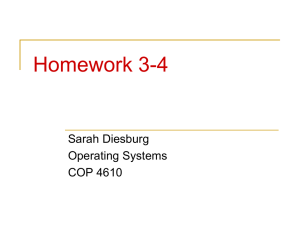FUNCTIONAL SPECIFICATION FOR SYSTEMC 2 . 0
advertisement
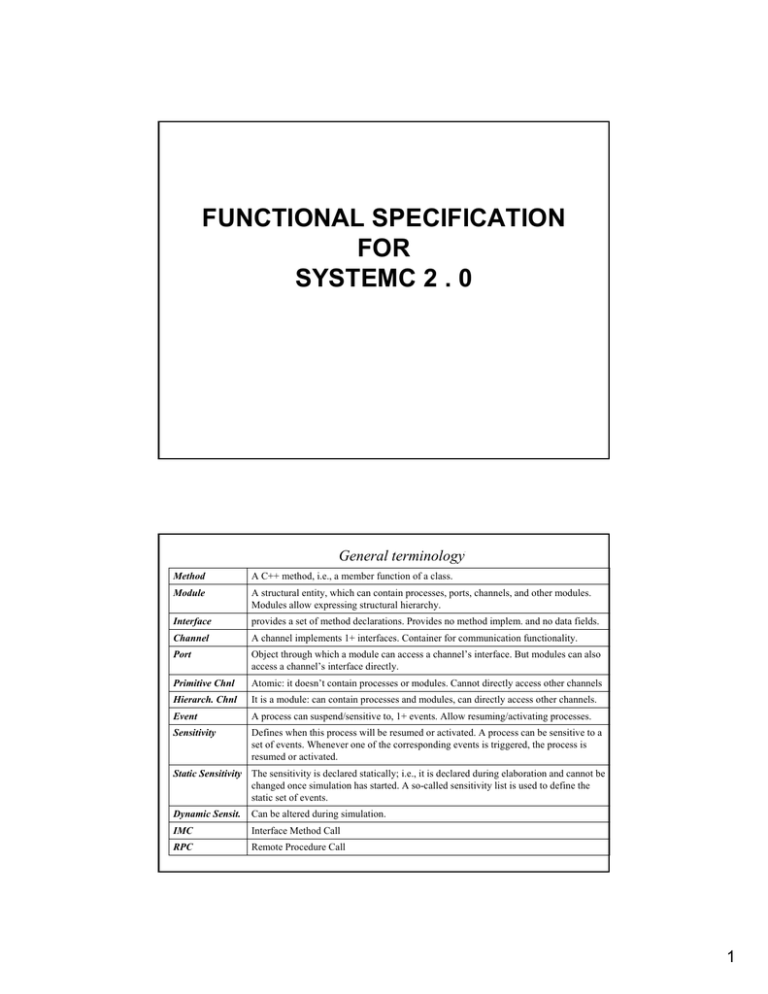
FUNCTIONAL SPECIFICATION FOR SYSTEMC 2 . 0 . General terminology Method A C++ method, i.e., a member function of a class. Module A structural entity, which can contain processes, ports, channels, and other modules. Modules allow expressing structural hierarchy. Interface provides a set of method declarations. Provides no method implem. and no data fields. Channel A channel implements 1+ interfaces. Container for communication functionality. Port Object through which a module can access a channel’s interface. But modules can also access a channel’s interface directly. Primitive Chnl Atomic: it doesn’t contain processes or modules. Cannot directly access other channels Hierarch. Chnl It is a module: can contain processes and modules, can directly access other channels. Event A process can suspend/sensitive to, 1+ events. Allow resuming/activating processes. Sensitivity Defines when this process will be resumed or activated. A process can be sensitive to a set of events. Whenever one of the corresponding events is triggered, the process is resumed or activated. Static Sensitivity The sensitivity is declared statically; i.e., it is declared during elaboration and cannot be changed once simulation has started. A so-called sensitivity list is used to define the static set of events. Dynamic Sensit. Can be altered during simulation. IMC Interface Method Call RPC Remote Procedure Call 1 Process terminology Thread A SystemC thread has its own thread of execution, but is not preemptive. Automatically activated Certain module methods (processes) are activated automatically when events occur that the processes are sensitive to. Explicitly activated Certain module methods must be called explicitly by other code in order to be activated. wait() A method that suspends execution of a thread. The arguments passed to wait() determine when execution of the thread is resumed. Ok to call wait() NO: SC_METHODs - because they don’t have their own thread of execution. YES: SC_THREADs and the code that they call can call wait(). SC_THREAD A module method which has its own thread of execution. Can call code that calls wait(). Automatically activated. aka thread process. SC_METHOD A module method which does not have its own thread of execution, and which cannot call code that calls wait(). SC_METHODs are automatically activated. aka method process. SC_CTHREAD A module method which has its own thread of execution. Sensitive to a +/-ive clock edge. Can call wait() with a restricted argument list. Automatically activated. aka clocked thread processes. Process intialization Prevent the scheduler from executing a thread process or method process during the initialization phase of the simulation 2 MODEL OF TIME • • • • • • • Underlying data type for time is a 64 bit unsigned integer The default time resolution is 1 picosecond change the time resolution : sc_set_time_resolution(10, SC_PS). The time resolution must be a power of ten. time resolution to be specified before the start of simulation. The time resolution can only be specified once. The time resolution can only be specified before any non-zero sc_time declaration. sc_set_time_resolution( 10, SC_PS ); ... wait( 3.456, SC_NS ); • rounds the time to wait to 3460 ps. sc_get_default_time_unit() sc_clock clk1( “clk1”, 15, SC_NS ); sc_start( 1000, SC_NS ); SC_FS – femtoseconds SC_PS – picoseconds SC_NS – nanoseconds SC_US – microseconds SC_MS – milliseconds SC_SEC – seconds Static sensitivity 3 Dynamic sensitivity with the wait() method Dynamic sensitivity • wait() can be called anywhere in the thread of execution of a thread process. • When called, – specified events temporarily overrule the sensitivity list – the calling thread process suspends – When one (or all) of the specified events is notified, the waiting thread process is resumed – The calling process is again sensitive to the sensitivity list. • When the wait() method is called without arguments – the calling thread process will suspend. – When one of the events in the sensitivity list is notified, the waiting thread process isresumed. • The static sensitivity of the calling thread process doesn’t change. 4 Forms of wait() Forms of wait() 5 NEXT_TRIGGER() METHOD • The wait() method only used with SC_THREADs. • next_trigger() method ≡ for SC_METHOD • same arguments as wait() • ≠: – next_trigger() returns immediately, without passing control to another process – Multiple next_trigger() calls allowed in one activation of an SC_METHOD process – The last next_trigger() call determines the (dynamic) sensitivity for the next activation EVENT TYPE 6 7 8 9 10 11 12 13 14 15 16 17 INTERFACE EXAMPLES Read/write interface 18 INTERFACE BASE CLASS All interfaces are (directly or indirectly) derived from base class sc_interface. SIMPLE PORTS • object through which a module, and hence its processes, can access a channel’s interface. • Modules can also access a channel’s interface directly • In SystemC 1.0, we have three basic port types: – sc_in<T>, sc_out<T>, and sc_inout<T> – They are all derived from the base class sc_port – Each of these port types provides • a set of interface methods, such as read() and write(). • what these methods basically do is to call the corresponding interface method of the attached channel. • With other channel types, this simple scheme has to be extended – the interfaces assumed by sc_in<T>, sc_out<T>, and sc_inout<T>, are not sufficient for all channel types. 19 General Ports • Some channel types may require additional or altogether different interface methods. • ≠ interfaces can be created by – refining predefined interface types – or by inheriting directly from sc_interface • Separate function and communication – to increase the reusability of components • A good design style – is to always select the “minimal” port type that offers the required interface methods ATTACHING MULTIPLE INTERFACES • SystemC 2.0 allows for connecting a port to multiple channels implementing the same interface. ⇒ the multi-port capability. 20 sc_mutex_if 21 sc_mutex channel sc_mutex channel: lock() • virtual int lock(); – If the mutex is unlocked • member function lock shall lock the mutex and return – If the mutex is locked • suspend until the mutex is unlocked (by another process) • attempt to lock the mutex. – Member function lock shall unconditionally return the value 0. • If multiple processes attempt to lock the mutex in the same delta cycle – which process instance is given the lock in that delta cycle • non-deterministic – relies on the order in which processes are resumed within the evaluation phase. 22 sc_mutex channel: trylock(), kind() • virtual int trylock(); – If the mutex is unlocked • member function trylock shall lock the mutex • shall return the value 0 – If the mutex is locked • member function trylock shall immediately return the value -1. • The mutex shall remain locked • virtual const char* kind() const; – Member function kind shall return the string "sc_mutex". sc_mutex channel: unlock(); • virtual int unlock(); – mutex unlocked, • member function unlock shall return the value -1 • The mutex shall remain unlocked – mutex locked by ≠ process • member functionunlock shall return the value -1 • The mutex shall remain locked – mutex locked by the calling process • member function unlock shall unlock the mutex • shall return the value 0 • If processes suspended and waiting for the mutex – lock shall be given (nondeterministic) to exactly one of these processes – remaining processes shall suspend again – This shall be accomplished within a single evaluation phase ⇒ use immediate notification to signal the act of unlocking a mutex 23 Port-less access for intra-module level communication Port-less access (cont’d) 24 Port-less access (cont’d) Port-less access (cont’d) 25 Port-less access (cont’d) … 26
